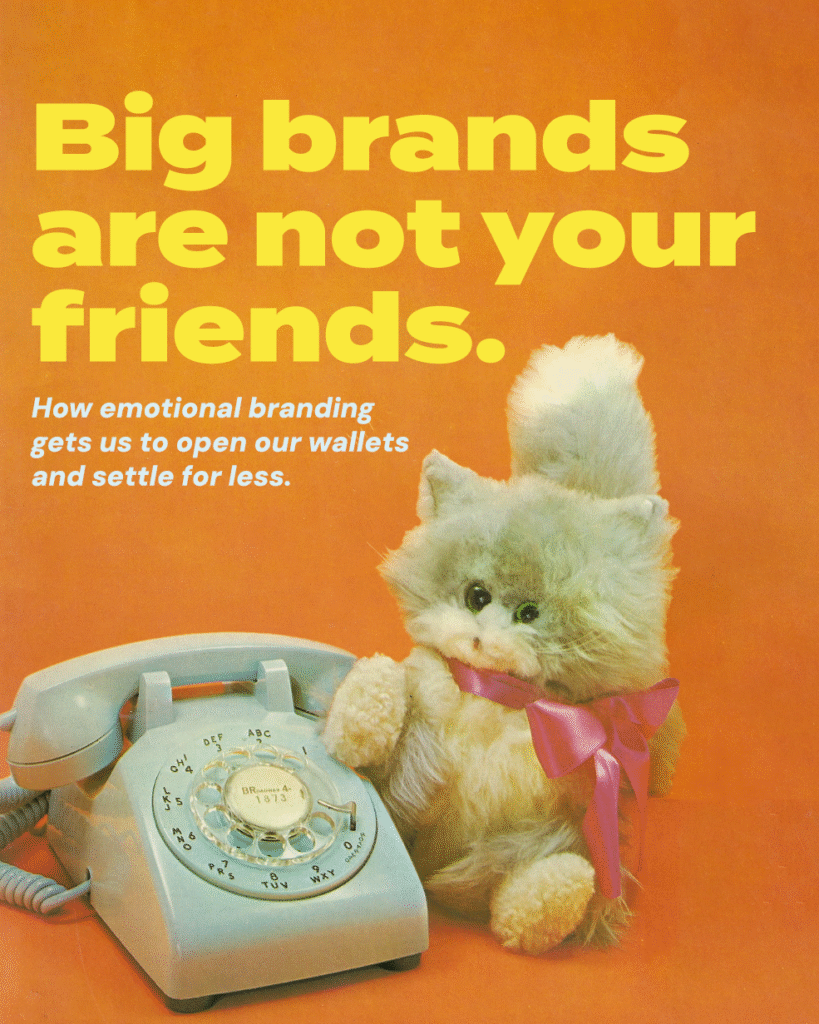
Brands don’t just sell products…they sell vibes!
They tap into your head, heart, and gut to make you feel something, and that feeling keeps you coming back.
Emotional branding is a marketing strategy where brands create strong emotional connections with customers. Yes, the goal is to sell products, but also…to build loyalty that keeps you coming back again and again.
Instead of focusing only on price or the product itself, emotional branding taps into things like:
Identity: “This brand represents who I am or want to be.”
Belonging: “This brand gets me and it makes me feel like I’m a part of something.”
Desire/Want: “Owning this makes me feel cool, powerful, loved, unique or ______”
Trust: “This brand feels safe and familiar, like a friend. I can rely on it to be there for me.”
Sure, we care about facts and data…but humans make most of their decisions emotionally. Even when we THINK we are being logical!
We prefer brands that make us feel something, whether that’s joy, nostalgia, pride, coolness, connection, or familiarity.
When we connect with the vibes of a brand, we’re more likely to:
Keep buying from them, possibly buying too much
Defend them online
Feel like they’re part of our identity
Ignore/excuse unethical practices
Accept less from them…whether that’s lower quality, declining service, or even lower wages at a “cool job”
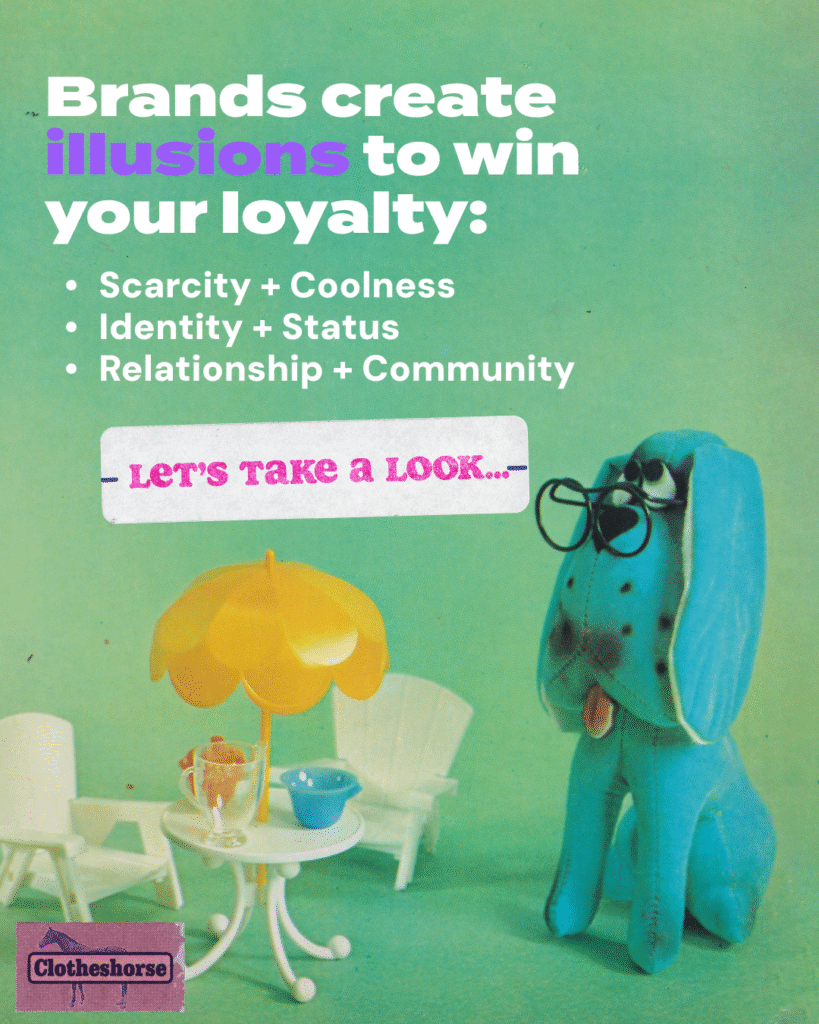
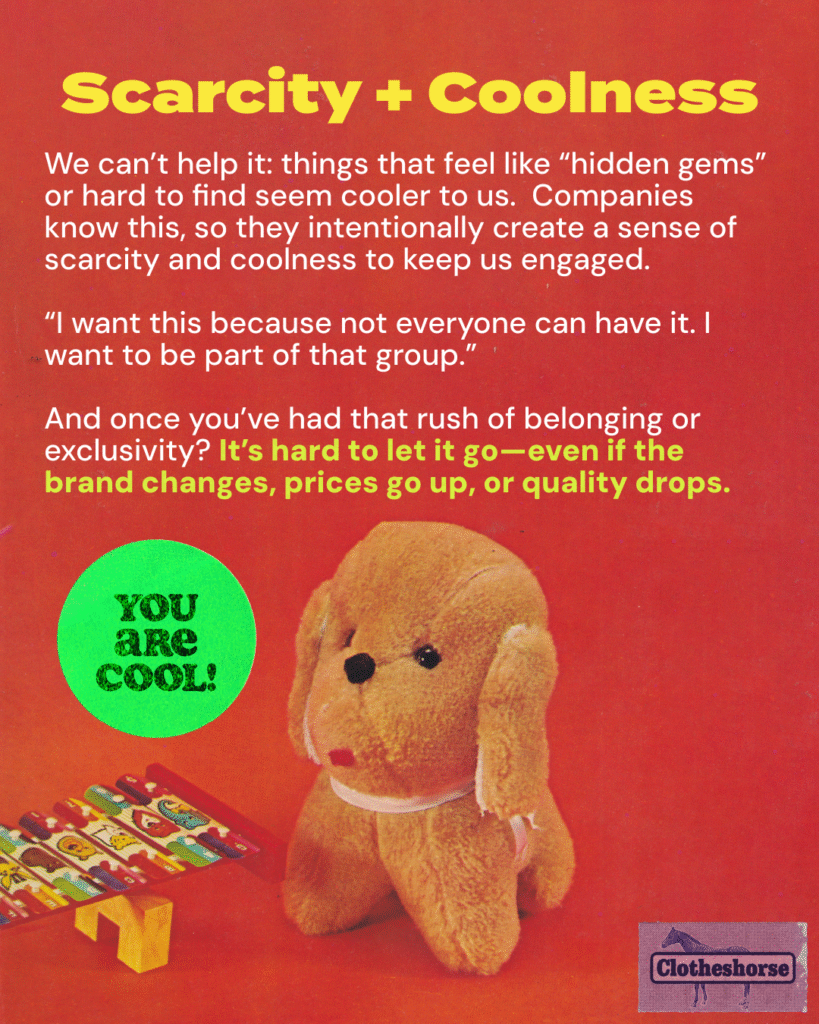
Supreme:
Limited drops + long lines = “if you know, you know” energy. You feel lucky (and super cool) just to get to buy something!
The limited drops create the illusion of a small, indie brand…but the reality is Supreme has been owned by mega corps since 2020.
Trader Joe’s seasonal products:
“Only here for a limited time!” That creates a sense of urgency, meaning you won’t hesitate to run out to buy them. Buying these items feels like being part of an “in the know” club.
Fans stock up, trade tips, and write angry posts when stuff is discontinued.
Stanley Cups:
New color drops sell out in minutes and “rare” colors become collector items.
Influencers make collecting these cups seem essential….but really they are promoting them because Stanley gives one of the highest commissions on product sales in the industry!
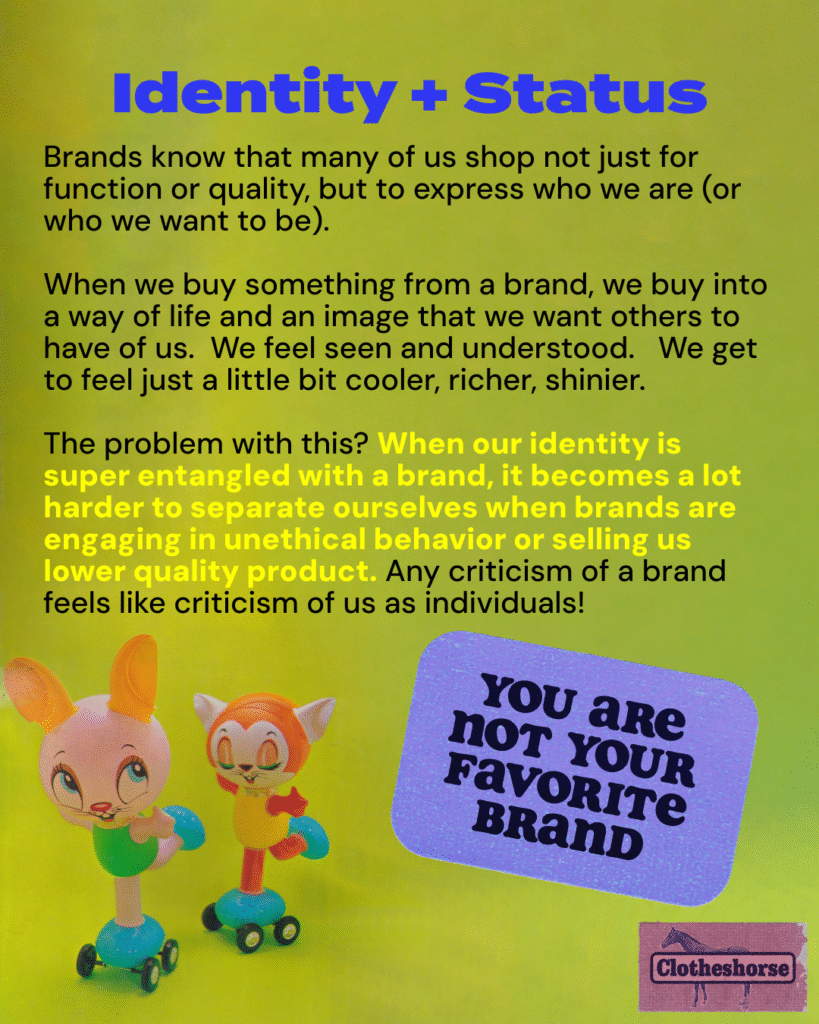
Anthropologie: signals to the world that you are eclectic, artsy, worldly, feminine, and you have some money to throw around. That doesn’t align with the reality that Anthro is a fast fashion brand.
Free People: sells you the feeling of being wild, ethereal, and untethered by capitalism…by participating deeply in capitalism (it’s also a fast fashion brand).
TJ Maxx: sells you the identity of being clever, strategic, and fashionable…but it’s actually selling you a lot of stuff that isn’t designer overstock!
Apple: signals to others that you are creative, intelligent, and discerning. Switching to an Android or a PC almost feels like a loss of identity! But in some cases, Androids and PCs might be a better product and better value.
Lululemon: wearing this brand tells others that you have some money, you’re into wellness, and you probably invest in nice skincare products, too. But the company has a lot of ethical issues that can be difficult to ignore.
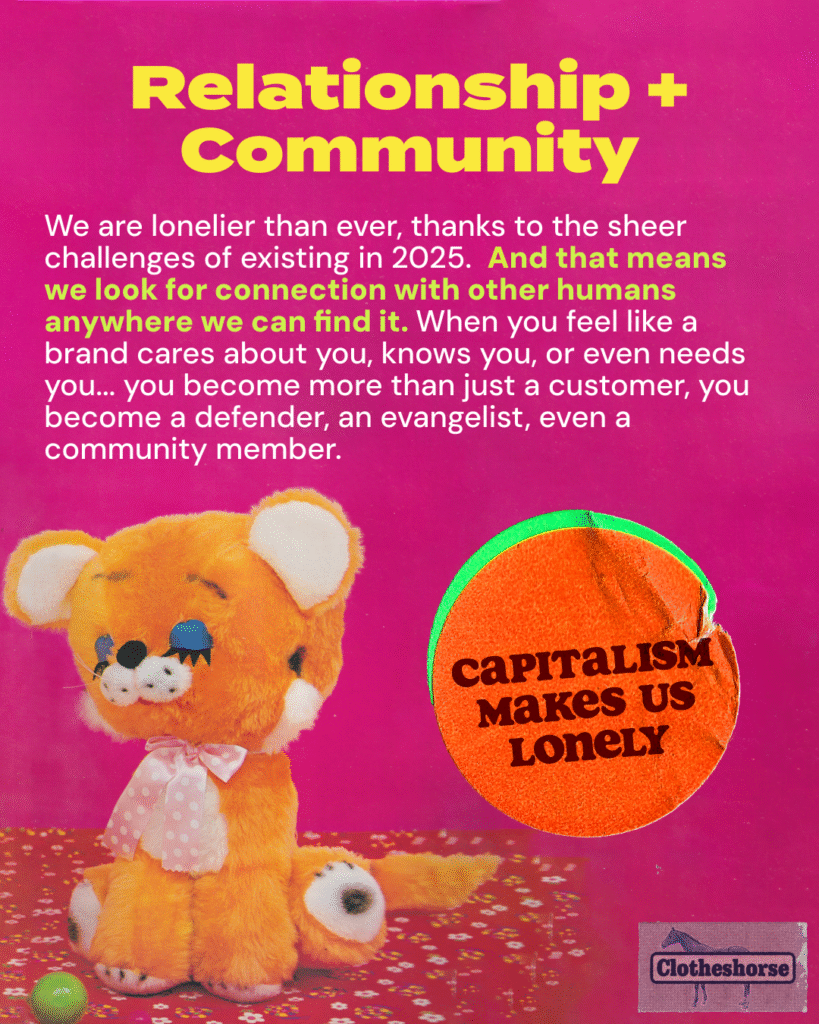
Aldi: Sure, it’s a discount grocery store, but it also has an extremely loyal and engaged fan base that values low prices, efficiency, and sort of “anti-snobbery.” “Aldi Aisle of Shame” is an entire subculture centered around Aldi’s middle aisle of limited edition stuff. There are FB groups, subreddits and social media accounts solely devoted to sharing finds, recipes, and product reviews.
Ulta: Has a tiered rewards program that definitely encourages customers to spend just a little bit more to reach that next level. In the Ulta subreddit, fans share haul photos, tricks for optimizing rewards points/gift with purchase, and product reviews. Furthermore, in the battle of “Ulta vs. Sephora,” Ulta leans into accessibility, value, and friendly vibes.
Spotify Wrapped: TBH this is emotional branding genius in action (tough for me to say as a podcaster with a partner who is a musician…we definitely feel exploited by Spotify). But think about it: when you get to share your Wrapped with others, it makes you feel seen, and it creates the feeling that you are part of a cultural moment.
There’s no shame in supporting your favorite brands and really loving the things you buy from them. But we also know that emotional branding is manipulation in cuter packaging. When a big brand says, “we see you,” it really means, “we want your money.”
The next time you feel weirdly attached to a brand…ask yourself: “Do I love this because it’s great? Or because it made me feel something?”
And TBH, that feeling might be real. But it was designed by a marketing team. When we recognize that, it makes it easier to change our shopping habits and hold brands accountable for unethical practices.
If you want to share your opinion/additional thoughts on the subjects we cover in each episode, feel free to email, whether it’s a typed out message or an audio recording: [email protected]
Slow Fashion Academy is a size-inclusive sewing and patternmaking studio based in Philadelphia, Pennsylvania. Designer and fashion professor Ruby Gertz teaches workshops for hobbyists and aspiring designers, so that anyone can learn the foundational skills of making, mending, and altering their own clothes. Ruby also provides professional design and patternmaking services to emerging slow fashion brands, and occasionally takes commissions for custom garments and costume pieces. She has also released several PDF sewing patterns for original designs under her brands Spokes & Stitches, and Starling Petite Plus. Check the schedule for upcoming workshops, download PDF sewing patterns, and learn about additional sewing and design services at www.slowfashion.academy.
Thumbprint is Detroit’s only fair trade marketplace, located in the historic Eastern Market. Our small business specializes in products handmade by empowered women in South Africa making a living wage creating things they love like hand painted candles and ceramics! We also carry a curated assortment of sustainable/natural locally made goods. Thumbprint is a great gift destination for both the special people in your life and for yourself! Browse our online store at thumbprintdetroit.com and find us on instagram @thumbprintdetroit.
Picnicwear: a slow fashion brand, ethically made by hand from vintage and deadstock materials – most notably, vintage towels! Founder, Dani, has worked in the industry as a fashion designer for over 10 years, but started Picnicwear in response to her dissatisfaction with the industry’s shortcomings. Picnicwear recently moved to rural North Carolina where all their clothing and accessories are now designed and cut, but the majority of their sewing is done by skilled garment workers in NYC. Their customers take comfort in knowing that all their sewists are paid well above NYC minimum wage. Picnicwear offers minimal waste and maximum authenticity: Future Vintage over future garbage.
Shift Clothing, out of beautiful Astoria, Oregon, with a focus on natural fibers, simple hardworking designs, and putting fat people first. Discover more at shiftwheeler.com
High Energy Vintage is a fun and funky vintage shop located in Somerville, MA, just a few minutes away from downtown Boston. They offer a highly curated selection of bright and colorful clothing and accessories from the 1940s-1990s for people of all genders. Husband-and-wife duo Wiley & Jessamy handpick each piece for quality and style, with a focus on pieces that transcend trends and will find a home in your closet for many years to come! In addition to clothing, the shop also features a large selection of vintage vinyl and old school video games. Find them on instagram @ highenergyvintage, online at highenergyvintage.com, and at markets in and around Boston.
St. Evens is an NYC-based vintage shop that is dedicated to bringing you those special pieces you’ll reach for again and again. More than just a store, St. Evens is dedicated to sharing the stories and history behind the garments. 10% of all sales are donated to a different charitable organization each month. New vintage is released every Thursday at wearStEvens.com, with previews of new pieces and more brought to you on Instagram at @wear_st.evens.
Deco Denim is a startup based out of San Francisco, selling clothing and accessories that are sustainable, gender fluid, size inclusive and high quality–made to last for years to come. Deco Denim is trying to change the way you think about buying clothes. Founder Sarah Mattes wants to empower people to ask important questions like, “Where was this made? Was this garment made ethically? Is this fabric made of plastic? Can this garment be upcycled and if not, can it be recycled?” Signup at decodenim.com to receive $20 off your first purchase. They promise not to spam you and send out no more than 3 emails a month, with 2 of them surrounding education or a personal note from the Founder. Find them on Instagram as @deco.denim.
The Pewter Thimble Is there a little bit of Italy in your soul? Are you an enthusiast of pre-loved decor and accessories? Bring vintage Italian style — and history — into your space with The Pewter Thimble (@thepewterthimble). We source useful and beautiful things, and mend them where needed. We also find gorgeous illustrations, and make them print-worthy. Tarot cards, tea towels and handpicked treasures, available to you from the comfort of your own home. Responsibly sourced from across Rome, lovingly renewed by fairly paid artists and artisans, with something for every budget. Discover more at thepewterthimble.com
Blank Cass, or Blanket Coats by Cass, is focused on restoring, renewing, and reviving the history held within vintage and heirloom textiles. By embodying and transferring the love, craft, and energy that is original to each vintage textile into a new garment, I hope we can reteach ourselves to care for and mend what we have and make it last. Blank Cass lives on Instagram @blank_cass and a website will be launched soon at blankcass.com.
Vagabond Vintage DTLV is a vintage clothing, accessories & decor reselling business based in Downtown Las Vegas. Not only do we sell in Las Vegas, but we are also located throughout resale markets in San Francisco as well as at a curated boutique called Lux and Ivy located in Indianapolis, Indiana. Jessica, the founder & owner of Vagabond Vintage DTLV, recently opened the first IRL location located in the Arts District of Downtown Las Vegas on August 5th. The shop has a strong emphasis on 60s & 70s garments, single stitch tee shirts & dreamy loungewear. Follow them on instagram, @vagabondvintage.dtlv and keep an eye out for their website coming fall of 2022.
Country Feedback is a mom & pop record shop in Tarboro, North Carolina. They specialize in used rock, country, and soul and offer affordable vintage clothing and housewares. Do you have used records you want to sell? Country Feedback wants to buy them! Find us on Instagram @countryfeedbackvintageandvinyl or head downeast and visit our brick and mortar. All are welcome at this inclusive and family-friendly record shop in the country!
Located in Whistler, Canada, Velvet Underground is a “velvet jungle” full of vintage and second-hand clothes, plants, a vegan cafe and lots of rad products from other small sustainable businesses. Our mission is to create a brand and community dedicated to promoting self-expression, as well as educating and inspiring a more sustainable and conscious lifestyle both for the people and the planet. Find us on Instagram @shop_velvetunderground or online at www.shopvelvetunderground.com
Selina Sanders, a social impact brand that specializes in up-cycled clothing, using only reclaimed, vintage or thrifted materials: from tea towels, linens, blankets and quilts. Sustainably crafted in Los Angeles, each piece is designed to last in one’s closet for generations to come. Maximum Style; Minimal Carbon Footprint.
Salt Hats: purveyors of truly sustainable hats. Hand blocked, sewn and embellished in Detroit, Michigan.
Republica Unicornia Yarns: Hand-Dyed Yarn and notions for the color-obsessed. Made with love and some swearing in fabulous Atlanta, Georgia by Head Yarn Wench Kathleen. Get ready for rainbows with a side of Giving A Damn! Republica Unicornia is all about making your own magic using small-batch, responsibly sourced, hand-dyed yarns and thoughtfully made notions. Slow fashion all the way down and discover the joy of creating your very own beautiful hand knit, crocheted, or woven pieces. Find us on Instagram @republica_unicornia_yarns and at www.republicaunicornia.com.
Cute Little Ruin is an online shop dedicated to providing quality vintage and secondhand clothing, vinyl, and home items in a wide range of styles and price points. If it’s ethical and legal, we try to find a new home for it! Vintage style with progressive values. Find us on Instagram at @CuteLittleRuin.